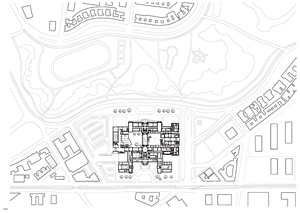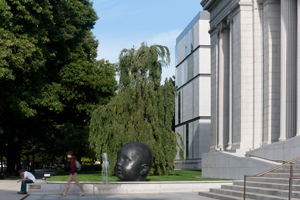 |
 |
 |
 |
 |
 |
| |
 |
|
 |
 |
 |
  |
  |
 |
 |
 |
 |
|
|
 |
|
 |
 |
 |
BUILDING |
 |
|
 |
|
 |
 |
 |
| |
 |
| 
 |
MFA Museum of Fine Arts
|
|
 |
 |
 |
 |
DESIGNER |
 |
|
|
 |
|
 |
 |
 |
| |
 |
|
 |
 |
 |
 |
DESCRIPTION |
 |
|
|
 |
|
 |
 |
 |
|
|
 |
 The Museum of Fine Arts, Boston (MFA), has been the subject of a major redevelopment and had a new wing designed by Foster + Partners. The masterplan reinstates the original formal axis of the Museum and opens it up to the Back Bay Fens and the linear park designed by Frederick Law Olmsted in 1877. The MFA’s new wing creates 53 new galleries and houses the Art of the Americas collections, one of the premier assemblages of American art. The Museum of Fine Arts, Boston (MFA), has been the subject of a major redevelopment and had a new wing designed by Foster + Partners. The masterplan reinstates the original formal axis of the Museum and opens it up to the Back Bay Fens and the linear park designed by Frederick Law Olmsted in 1877. The MFA’s new wing creates 53 new galleries and houses the Art of the Americas collections, one of the premier assemblages of American art.
Foster + Partners, working with CBT/Childs Bertman Tseckares of Boston, have carefully restored and augmented one of the world’s finest art museums to transform the experience for visitors, opening up the building to the community and consolidating the Museum’s five great collections into a more cohesive and understandable whole.
 Founded in 1870, the Museum of Fine Arts is based on a Beaux-Arts plan devised by the architect Guy Lowell. Restoring the logic of the original scheme, the building’s central axis has been reasserted with the reintroduction of the principal entrance to the south, on Huntington Avenue on the Avenue of the Arts, and the reopening of that to the north, the State Street Corporation Fenway Entrance. At the heart of this axis is a new information centre, where visitors begin their tour. Founded in 1870, the Museum of Fine Arts is based on a Beaux-Arts plan devised by the architect Guy Lowell. Restoring the logic of the original scheme, the building’s central axis has been reasserted with the reintroduction of the principal entrance to the south, on Huntington Avenue on the Avenue of the Arts, and the reopening of that to the north, the State Street Corporation Fenway Entrance. At the heart of this axis is a new information centre, where visitors begin their tour.
Alongside is a freestanding glazed structure, which has been inserted between the building’s two main pavilions to create the Art of the Americas Wing. Arranged over four floors, the new wing significantly increases the Museum’s exhibition space, enabling some 5,000 works from the collection to be displayed. The project is the first time Foster + Partners has comprehensively designed a complete gallery wing, including installations and fit-out – the plan for the 53 galleries was the result of close collaboration with the Museum’s curators and conservators. Where the central building of the wing meets the axis of the main building, it partly encloses an existing courtyard in glass. This creates spaces for visitors, a café, special events and access to other collections with a new gallery for special exhibitions beneath.
Designed to be energy efficient, the courtyard is naturally lit and the galleries have state-of-the-art climate control. The gallery spaces are configured to allow art to be displayed with a more obvious sense of clarity and light. Surrounding the Museum, new landscaping is designed to strengthen links with the Back Bay Fens, laid out by Olmsted, architect of New York’s Central Park. The landscape design follows Olmsted’s Romantic tradition of winding paths and informal planting to draw the greenery of the Fens into the building. In particular, the Fens landscape is drawn into the heart of the Museum, encapsulating the new Courtyard and American Wing.
Edit by Foster + Partners
Credits
Photo © Nigel Young, courtesy by Foster + Partners
Drawings © Foster + Partners
|
|
 |
 |
 |
|
 |
|
|
|
 |
|
 |
 |
 |
 |
 |
 |
 |
ECO-SUSTAINABILITY |
 |
|
|
 |
|
 |
 |
 |
|
|
 |
Building re-use and restoration rather then rebuilding
Energy efficient ventilation system
Natural light, as permitted by the display of art, reduces artificial lighting demands
Energy efficient lighting connected to light and motion sensors, and efficient centralised HVAC systems
Sanitary fittings with low flow-rates specified, including PIR sensing taps which will reduce water consumption by 25%
Triple glazing to minimise thermal transmission
Extensive sun-shading devices to minimise need for cooling
Commitment to reduce car-use by, taking advantage of the MBTA tram stop in front of the Museum. The MFA provides 25% subsidy of monthly MBTA passes for employees, bicycle parking in the garage and market-rate parking fees
Landscaping minimises irrigation - species require minimal or no irrigation
Storm water management to capture rainwater and allow for slow infiltration into the sewage network, reducing the risk of flooding |
|
 |
 |
 |
 |
 |
 |
 |
LOCATION |
 |
|
|
 |
|
 |
 |
 |

|
 |

|
Continent |
|
 |
  North America |
|
Nation |
|
 |
  United States |
|
State |
|
 |
  Massachusetts |
|
County |
|
 |
  Suffolk |
|
Town |
|
 |
  Boston |
|
Address |
|
 |
  465 Huntington Avenue, Forsyt Way
|
|
|
|
 |
|
Website |
|
 |
|
 |
 |
 |
 |
MAP |
 |
|
|
 |
|
 |
 |
 |
| |
 |
|
 |
 |
 |
 |
|
TYPOLOGY |
 |
|
|
 |
|
 |
 |
 |
Main |
 |
|
 |
ARCHITECTURE | Museums and buildings for exhibitions
Art museums
Operations on existing buildings
Extension, superelevation
| |
|
|
 |
|
Additional |
 |
|
 |
ARCHITECTURE | Buildings for cultural activities
Conference halls
Education buildings
Training centres and schools
Commercial buildings
Bars, cafeterias
Buildings for recreational activities
Auditoriums and music centres
| |
 |
 |
 |
 |
CHRONOLOGY |
 |
|
|
 |
|
 |
 |
 |
Project |
 |
|
 |
| 
 |
1999
|
|
Realisation |
 |
|
 |
| 
 |
2005 - 2010 |
|
 |
 |
 |
 |
BIBILIOGRAPHIC REFERENCES |
 |
|
|
 |
|
 |
 |
 |
|
 |
| John E. Czarnecki, "Lord Foster unveils Boston's Museum of Fine Arts expansion plan", Architectural Record 3/2002, march 2002, p.23 |
|
 |
 |
 |
 |
 |
 |
 |
CLIENT |
 |
|
|
 |
|
 |
 |
 |
| |
 |
| Museum of Fine Arts, Boston |
|
 |
 |
 |
 |
DIMENSIONAL
DATA |
 |
|
|
 |
|
 |
 |
 |
| Surface |
 |
|
 |
Pre-construction: sq.m. 44,914 (sq.ft. 483,447)
Demolished building: sq.m. -5,559 (sq.ft. -59,835)
New construction: sq.m. 17,960 (sq.ft. 193,325)
MFA total building: sq.m. 57,315 (sq.ft. 616,937) (-28% increase)
Total MFA Gallery: sq.m. 20,556 (sq.ft. 221,267) (-16% increase)
Art of the Americas Wing: sq.m. 11,270 (sq.ft. 121,307)
Art of the Americas Wing Gallery: sq.m. 4,769 (sq.ft. 51,338) (-42% increase)
Ruth and Carl J. Shapiro Family Courtyard: sq.m. 11,319 (sq.ft. 121,840)
Ann and Graham Gund Gallery: sq.m. 769 (sq.ft. 8,280)
Education Center: sq.m. 400 (sq.ft. 4,300)
Barbara and Theodore Alfond Auditorium: sq.m. 198 (sq.ft. 2,128)
Jean S. and Frederic A. Sharf Visitor Center: sq.m. 457 (sq.ft. 4,920) |
|
| Floors |
 |
|
 |
3 aboveground
1 underground |
|
| Height |
 |
|
 |
|
| Number |
 |
|
 |
|
 |
 |
 |
 |
STRUCTURES |
 |
|
|
 |
|
 |
 |
 |
| |
 |
|
 |
 |
 |
 |
LANDSCAPE DESIGN |
 |
|
|
 |
|
 |
 |
 |
| |
 |
| Gustafson Guthrie Nichol Ltd. |
|
 |
 |
 |
 |
STAFF |
 |
|
|
 |
|
 |
 |
 |
Project  |
 |
|
|
 |
|
|
 |
|
Design team |
 |
| Norman Foster, Spencer de Grey, Michael Jones, Kate Murphy, John Small, William Castagna |
|
Collaborators |
 |
| Benedicte Artault, Robin Blanchard, Jan Coghlan, Chris Connell, Aaron Davis, Gennaro di Dato, James Edwards, Dagmar Eisenach, Morgan Fleming, Kristin Fox, Herbert Gsottbauer, Anthony Guma, Sean Hanna, Rie Haslov, Judith Kernt, Ismael Juan Khan, Kohelika Kohli, Abel Maciel, Peter Matcham, Pablo Menendez Paz, Aidan Monaghan, Yat Lun Ng, Mathis Osterhage, Silvia Paredes, Carol Patterson, Michael Pelken, Michael Richter, Katherine Ridley, Il Hoon Roh, Ingrid Sölken, Kinna Stallard, Matthew Stokes, Diego Suarez, Jane Tiley, Alexis Williams, Oliver Wong, Richard Yates |
|
Architect of record |
 |
| CBT/Childs Bertman Tseckares Inc. |
|
Structural consultant |
 |
| Weidlinger Associates (venue consultant) |
|
Systems |
 |
Buro Happold (project)
WSP Flack + Kurtz (venue consultant) |
|
Construction management |
 |
George B.H. Macomber Company (Pre-Construction Services)
Skanska USA Building Inc. (Enabling Contractor)
John Moriarty & Associates (General Contractor) |
|
Environmental design |
 |
|
Geotechnical |
 |
|
Civil engineer |
 |
|
Transport planning |
 |
|
Lighting design |
 |
|
Acoustical consultant |
 |
|
Graphics and signage |
 |
| Roll Barresi & Associates, Inc. |
|
Cladding consultant |
 |
| Simpson Gumpertz & Heger Inc. |
|
Computerization |
 |
| IR Security & Safety Consultants of New England |
|
Planning and organization |
 |
| Robert Luchetti Associates Inc. |
|
Consultant |
 |
| Orca Consulting Group (Pedestrian Flow) |
|
Vertical transportation |
 |
|
 |
  |
 |
|
|